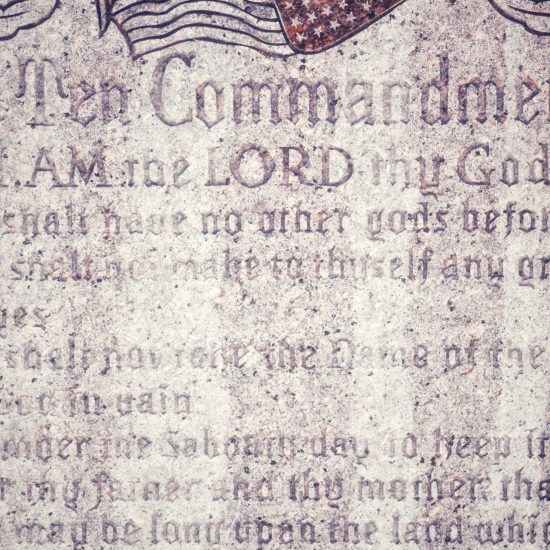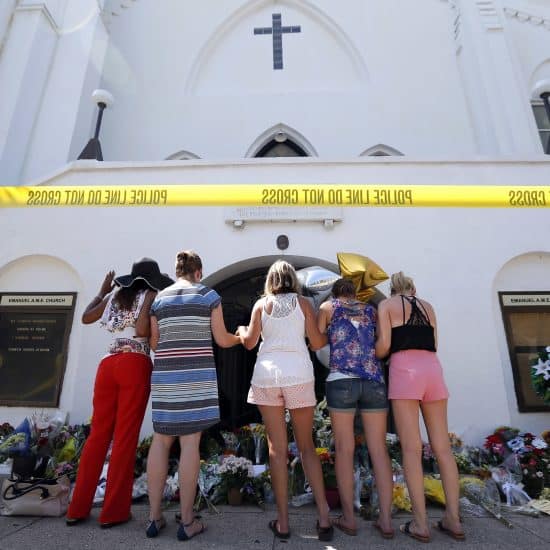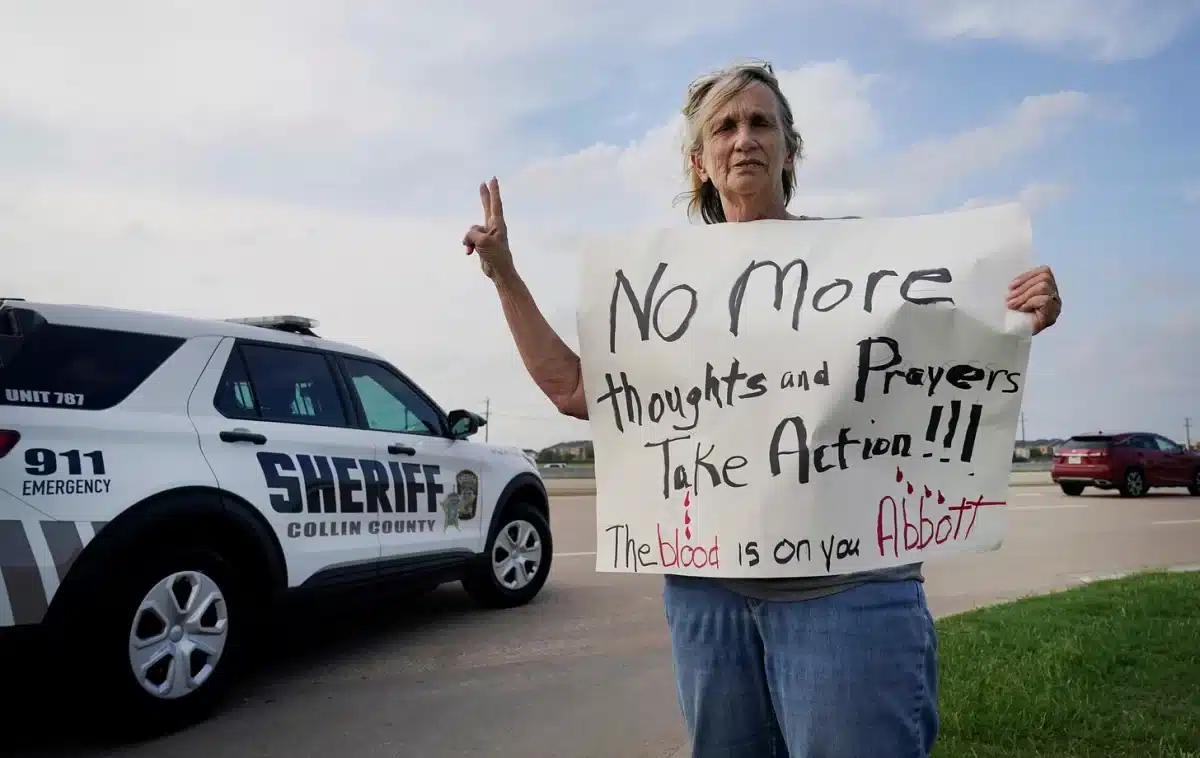
On Saturday (May 6), a gunman with a semi-automatic rifle opened fire in an Allen, Texas, outlet mall, killing eight people and injuring seven others. The next day, U.S. Rep. Keith Self, a Republican whose district includes Allen, appeared on TV to offer his thoughts and prayers. CNN’s Paula Reid noted that “many people argue that prayers aren’t cutting it, prayers are not preventing the next mass shooting.” Self responded by attacking the faith of those who make such a suggestion.
“Well, those are people that don’t believe in an almighty God who has, who is absolutely in control of our lives. I’m a Christian. I believe that he is,” he said. “I know people want to make this political, but prayers are important.”
Reid reminded the congressman that the conversation is inherently political since he’s a politician and actions to prevent mass shootings would require legislative votes. She added, “I believe it is possible to both pray for the victims but also think ahead as a politician and as an elected representative about how you keep your community safe.” But Self refused to offer any steps except praying for the victims and their families.
As CNN’s Reid correctly noted, there is a growing chorus complaining about politicians who tweet “thoughts and prayers” after a mass shooting but then do nothing to answer those prayers (or worse, vote to make it easier for more people to get more guns). As a result, some of the do-nothing politicians like Self are claiming their critics don’t believe in prayer or God. While there are many atheists who criticize the “thoughts and prayers” rhetoric, there are also many Christians and other believers who do so as well.
“Our thoughts and prayers are not enough — it’s time to take action,” President Barack Obama declared in 2015 after a shooting at a community college in Oregon.
As a Washington Post analysis in 2019 showed, Obama’s comment came just as online tweets about the phrase “thoughts and prayers” were moving from being mostly people offering the sentiment to instead being mostly tweets critical of those who say such things without taking actions. As I explained in that Washington Post article, Obama likely helped that shift given his visibility as president. And I noted why I find it troubling to hear the rhetoric of “thoughts and prayers” from those who take no action to actually prevent gun violence. I explained that such rhetoric can “hurt faith” as “prayer becomes merely a political shield for one side that feels like they need to defend their gun rights or their political ideology.”
As one who prays every day (though not anywhere close to Paul’s exhortation of “without ceasing”), I believe in prayer. But I also believe that faith without works is dead. And I believe that there are hypocrites who will stand up front to be seen while praying but aren’t really seeking God. Praying for people who lost loved ones in mass shootings is important. But so is doing something to stop the next massacre.
If we pay attention to how politicians talk and act, we can quickly gain insights into if they sincerely offer prayers after mass shootings — which is particularly important as 2023 is on a record pace for mass killings. So this issue of A Public Witness will look at the divergent behaviors of Texas Gov. Greg Abbott on political issues before considering the protesters at an official prayer vigil in Allen, Texas, on Sunday.
When Prayers Aren’t Enough
Eight days before the shooting at the outlet mall, another mass killing in Texas garnered national headlines. A man is accused of entering a neighboring home and killing five people — including a nine-year-old child and two women who were shielding children — after one of his neighbors complained about the noise that night as he shot his semi-automatic rifle in his yard. Gov. Greg Abbott put out a statement claiming his heart went out to the families of the victims, but he started the message by writing that a gunman had “killed five illegal immigrants.”
Abbott’s despicable attack on the victims — whose immigration status didn’t matter in this case — showed a desire to politicize the shooting to be a policy issue about anything other than guns. His office later apologized, but not for the dehumanizing rhetoric. Instead, they expressed remorse that it may have been inaccurate: “We’ve since learned that at least one of the victims may have been in the United States legally.”
Of course, such rhetoric fits with the governor’s track record. In 2019, he sent out a campaign mailer attacking immigrants who illegally entered the country. He urged supporters to “defend Texas” by being willing “to take matters into our own hands.” The mailer sparked controversy because it was dated a day before a man who wrote a White Nationalist manifesto targeted Latinos in a Walmart in El Paso — killing 23 people and injuring 23 others with a semi-automatic rifle.
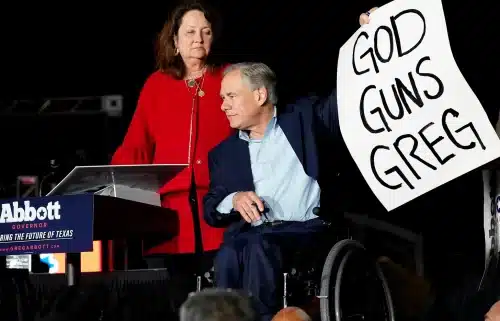
Texas Gov. Greg Abbott, with his wife Cecilia, attends a reelection campaign event on March 1, 2022, in Corpus Christi, Texas. (Eric Gay/Associated Press)
Abbott continued his rhetoric against immigrants yesterday in his first public address after the Allen outlet mall shooting. Abbott went to the border. But he didn’t offer “thoughts and prayers” about illegal immigration, nor did he attend a church vigil to pray that God would make everything better at the border. Instead, he announced new policy initiatives — like deploying 450 National Guard soldiers to the border — to add to previous actions on this issue he’s taken as governor. With that move, Abbott proved he doesn’t believe “thoughts and prayers” are enough.
And he proves that on a host of issues. When it comes to eliminating abortions, Abbott doesn’t just offer “thoughts and prayers” and then shrug off suggestions at legislative options. When it comes to stopping the alleged teaching of critical race theory in schools, Abbott doesn’t just attend a prayer vigil and then say it’s just a heart problem that needs fixed. When it comes to trying to restrict voting rights, Abbott doesn’t just promise to pray about it and then insist he doesn’t want to be political. And when it comes to gun bills passed by the legislature during his tenure — like those allowing concealed firearms on college campuses or letting people openly carry firearms in public places and even private businesses — Abbott didn’t offer his “thoughts and prayers” but picked up his pen and signed the legislation.
If Abbott or other politicians truly believed “thoughts and prayers” were all that were needed to solve issues, they wouldn’t run for political office. Instead of trying to pass bills, they would join a monastery.
By his deeds on various issues, Abbott proves that when he offers just “thoughts and prayers” after a mass shooting, he doesn’t want the status quo to change. That means his alleged prayers are a smokescreen as he tries to hide behind God while protecting guns over people. But the nakedness of such politicians is on display. And the blood of the slaughtered masses cries out from the ground.
Get cutting-edge reporting and analysis like this in your inbox every week by subscribing today!
Prayer & Protest
On Sunday — the day between the shooting at the outlet mall and Abbott’s press conference at the border — Abbott joined other politicians in attending a prayer vigil at a large Southern Baptist church in Allen. The event was a “thoughts and prayers” approach that would keep Abbott comfortable in his inaction.
The governor didn’t need to worry about hearing a push for gun reforms at an event opened by the church’s executive pastor for stewardship and operations who is also a Republican politician who just finished ten years as a state representative. And the church previously hosted a showing of a conspiracy film falsely claiming Donald Trump won the 2020 presidential election.
During the vigil at the MAGAchurch, the leadership started by recognizing all the politicians present. Then people sang “Amazing Grace” and prayed for the loved ones of those killed. Some of the church’s ministers and a few local politicians spoke about the importance of prayer. The mayor-elect offered his take on what the solution would be.
“Prayer is going to be what we’re going to need to go forward,” he said. “We’re going to need prayer. … Jesus, take the wheel.”
The only tangible suggestion of possible steps to reduce gun violence came as one man in the audience shouted, “What about the gun laws? Vote out Republicans!” He was quickly escorted out by police. His comment came as the church’s senior pastor said he longed for the words “that would fix it” but doesn’t have that sentence or phrase. But the pastor just kept preaching after the outburst about gun laws, suggesting he still couldn’t think of what to say to make the community better. So he read from Isaiah about comforting those who mourn and grieve. In his telling, praying and comforting of others was all that people could offer.
In addition to the man who shouted out the answer and a few people wearing orange and holding “enough is enough” signs, a crowd gathered outside with protest signs, clearly showing the prayer vigil failed to unite the grieving community. And unlike the declarations inside of “peace, peace” when there is no peace, the people outside offered the clear message that guns are the problem. People held signs declaring, “We have an epidemic of gun violence,” “My kids are worth more than your guns,” “Thoughts and prayers are useless. The dead are still dead,” and “Abbott, blood is on your hands.”
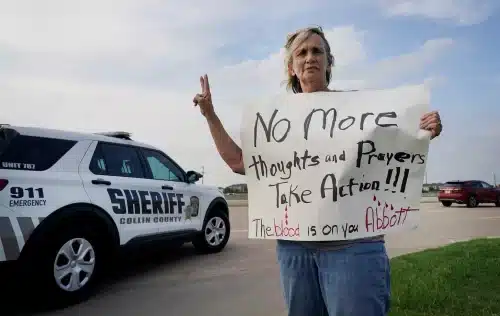
Mary Ann Foley holds a protest sign outside a prayer vigil on May 7, 2023, in Allen, Texas. (LM Otero/Associated Press)
While court preachers soothed the consciences of politicians inside, people dared to speak the truth outside. And that’s the response we should offer to meaningless declarations of “thoughts and prayers” by those who want to keep the status quo intact. People who offer sincere prayers and try to prevent future tragedies deserve praise. But those who use faith as a shield for their inaction profane prayer and heap more sacrifices onto the altar of a semi-automatic idol.
We can put our prayers into action. If we don’t, we make a mockery of our prayers — just like the prophet Isaiah taught us several chapters before the section read during the Allen prayer vigil.
“Stop bringing meaningless offerings!” the prophet wrote as God’s warning. “They have become a burden to me; I am weary of bearing them. When you spread out your hands in prayer, I hide my eyes from you; even when you offer many prayers, I am not listening. Your hands are full of blood!”
Turns out, God isn’t a fan of disingenuous “thoughts and prayers” either.
As a public witness,
Brian Kaylor


